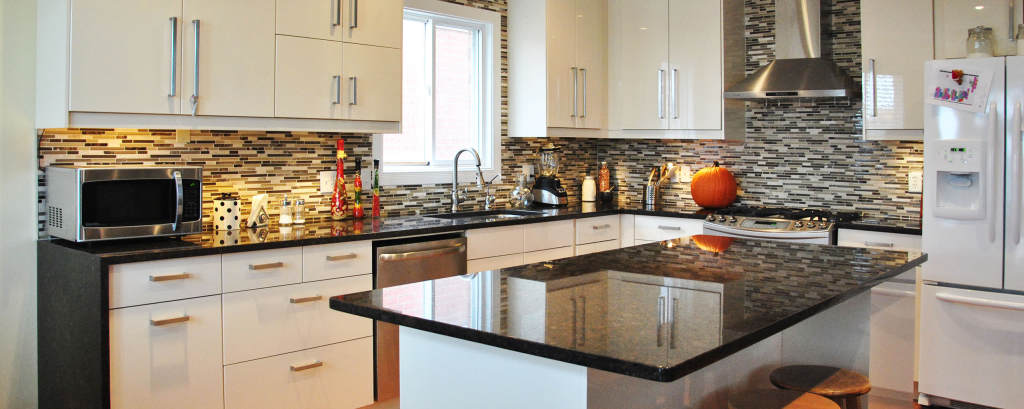Creating a sophisticated ambiance with natural stone in your home gives it a sense of beauty and permanence that is uniquely yours. Installing new countertops with stone materials dramatically changes the appearance of your kitchen. You can achieve extraordinary elegance with durable, natural stone when you understand its qualities.
Choosing Granites
As the hardest stones that are popular for countertops, granites resist scratches and abrasion. The American Society for Testing and Materials International classifies anorthosite, diabase, diorite, gabbro and gneiss as granites, even though they are not geologically equivalent. True granite typically resists scratches and abrasion from household cleansers, but minerals in granite-like stones may have a vulnerability to acids.
Marbles, Onyxes and Serpentines
Distinctive veins and bold colors make serpentines, onyxes and marbles preferred for their aesthetic appeal. While they may introduce the quality of beauty that you desire for your kitchen, you may want to reconsider using them. Even though it is difficult to think of stones as soft, these are relatively softer than granite. Setting a kitchen utensil on a marble surface can create scratches that mar the finish, a disappointing outcome when preparing a gourmet meal is the focus of your attention.
Preventing damage to marble requires you to take a few precautions that you may prefer to avoid. Always having cutting boards or protective mats available can preserve your marble countertop and prevent regret for mishaps in the kitchen. Acidic foods such as tomatoes, vinegar and lemon juice can permanently etch the surface. A sealer can protect the surface to some extent, but it is not a reliable alternative. Considering the care that you must exercise to avoid contacting a marble countertop with utensils or acidic food, you may correctly decide that it is not the best choice for use in a kitchen. Cleaning with inappropriate cleaning agents produces the same kind of damaging effect as acidic food.
Selecting Travertines and Limestones
Water and abrasion are concerns when you select countertops of limestone or travertine. Sealing them can prevent absorption of water that is almost always prevalent in a kitchen. Composed of calcium, these stones have properties that are similar to marble. Polished stones are particularly susceptible to damage from abrasion.
Electing to Use Slates
You may recall that your chemistry laboratory countertops in high school were slate, but they did not face the challenges that your kitchen presents. Slates are not as hard as granite, and they are easy to mar with abrasion or scratches. The uneven surface of natural slate may not meet your requirements, and it is often the only kind that some suppliers carry. A honed version provides a smoother option. Slates require the same kind of care as marbles.
Nature required millions of years to produce the beautiful stones that can provide the elegant sophistication that you desire for your kitchen. The forces that produced their vibrant colors and gorgeous veins made them extraordinarily lovely but not resistant to modern kitchens’ contents. Most natural stones suffer damage from acidic food or inappropriate cleaning agents. Granite is the hardest natural stone and the most durable choice for countertops today.
For more information visit: Granite Gold
